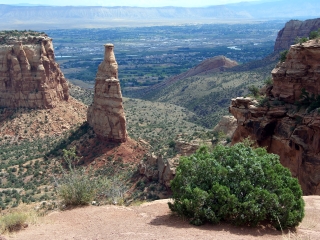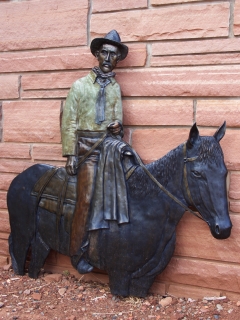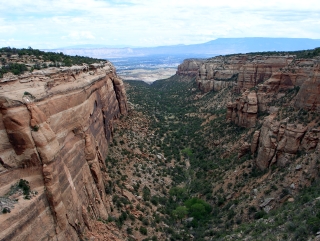Colorado National Monument
Grand Junction, Colo.
Visited: August 20, 2005
NPS Site Visited: 230 of 353
NPS Website
 WHAT IS IT? WHAT IS IT?
Breathtaking red sandstone rock formations, canyons and mesas standing near the confluence of the Colorado and Gunnison Rivers.
BEAUTY (8/10)
The red-rock mesas, 2,000-foot high cliffs, eroded sandstone spires and oddly beautiful scenery of Colorado NM are a preview of the madness to follow downstream. The Monument sits at the edge of the Colorado Plateau, where the Colorado River country begins to get interesting. Downriver are Arches, Canyonlands, Glen Canyon and finally the Grand Canyon.
Grand Junction and the Colorado River are sandwiched between the Monument to the south and the Grand Mesa to the north. Dizzying vistas from the Monument look out to the Mesa’s imposing sand castle-like appearance. We have not yet seen a city that enjoys a more dramatic setting than Grand Junction.
HISTORIC SIGNIFICANCE (2/10)
Colorado NM’s limited history revolves around one man, John Otto. Thought crazy by most, Otto diligently worked to make the Monument a part of the National Park Service. Otto had one true love: the Park. His marriage failed because he refused to sleep indoors. Otto blazed most of the Park’s trails, sent countless letters to Washington D.C. and in 1911 his Park was federally recognized and he was made superintendent, a position he held until 1927.
CROWDS (6/10)
Auto tour-based Sites tend to limit personal interaction. There was plenty of parking at all the overlooks. We were bewildered at one vista by a large crowd of people and dozens of cars. That must be some kind of view. Further binocular-aided inspection revealed a lovely wedding. What an unbelievable place to tie the knot.
 EASE OF USE/ACCESS (4/5) EASE OF USE/ACCESS (4/5)
Colorado NM is located in west-central Colorado, less than four miles from the charming urban center, Grand Junction. The Park’s centerpiece is its 23-mile long Rim Rock Drive that leads up the canyon and onto the mesa, offering astounding views of the red rock surroundings. There are a few hiking trails but Colorado NM is primarily and auto-touring destination.
The Park has two entrances, West and East. They connect Rim Rock Drive. We suggest entering the Park from the West (Fruita) entrance because of its proximity to the Visitor Center (only 4 miles). To get to the West entrance, take Exit 19 of Interstate 70. Follow signs southward along Colorado 340 for about 2 miles and you are there.
The East (Grand Junction) Entrance is located on Monument Road. Monument Road meets up with Colorado 340 in less than four miles. Route 340 will return you to Interstate 70, the way you turn, east or west, depends on which way you are going.
CONCESSIONS/BOOKSTORE (3/5)
The store stocks a good, albeit very standard, selection of western National Park site books. We thought the colorful satellite map of Grand Junction was cool.
COSTS (3/5)
Entry is $3 person, $5 per vehicle or free with the National Parks Pass.
RANGER/GUIDE TO TOURIST RATIO (3/5)
One Ranger staffed the Visitor Center, ably answering intense geology questions from a group of graduate students. We tried to get our questions in but to no avail. It is not so nice when the shoe is on the other foot. We will try to be more concise our Ranger questions in the future. We promise.
TOURS/CLASSES (7/10)
We narrowly missed the twice-daily Ranger-led geology talk. So instead, we asked to see the Park’s secondary intro film, the one that focuses on geology. The film, produced by the University of Colorado’s Interactive Geology Project, explains the complicated geological history of the area through computer animations and helpful narration. The computer animations show the land throughout time. Concepts that are too difficult to grasp (oceans covering the area, geologic uplift rock layers and 1.7 billion year old mountain building) come to life before your very eyes. Our only detraction: we wish that the animations would have zoomed out from the Colorado NM focus, put everything in context and shown the greater geologic workings of the North American continent.
 While at the Monument, see the geology film. If Grand Junction is not in your plans, just download the animation from the U of C website. They are working on a Grand Canyon reenactment as well. While at the Monument, see the geology film. If Grand Junction is not in your plans, just download the animation from the U of C website. They are working on a Grand Canyon reenactment as well.
The regular intro film is the southwestern Park standard, stop-action photograph, beautiful scenery Park promotion video. It is not nearly as interesting as the geology lesson. The Park Museum is Mission ’66-era construction.
FUN (6/10)
“Uh, Gab, look at that,” Michael warily said while he pulled to the side of the road. “Those aren’t vultures.” We got out of the car, pulled out the binoculars and saw three golden eagles fly less than 20 feet above our heads. We did not even need the binoculars to see to the markings of two full-grown and one juvenile. When it rains, it pours. We had yet to see the majestic birds during our lifetimes. The first two appeared at Great Basin NP, then these three, three days later at Colorado NM. In three days, we would see the last of our trip at Rocky Mountain NP. Incredible, incredible birds.
We skipped all but a few of the hiking trails at Colorado NM in favor of the auto tour. We were not up for steep descents and the subsequent ascent back to the car, especially with threatening thunder cloud skies in the distance. We think we saw a good representation of the Park and had little desire to do more. We did not camp either. The choice is easy when it is between pitching the tent in the rain or a cheap motel in a fun town.
WOULD WE RECOMMEND? (6/10)
The Colorado NM is stunning in its own right just not as astounding as the red rock formations down the river. The Site is more of an appetizer than a main dish. Still, if you are traveling west on Interstate 70, you should definitely take the scenic drive.
TOTAL 48/80
|